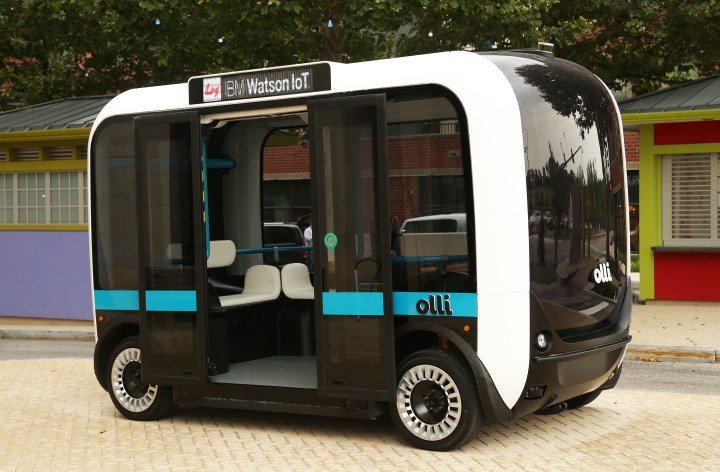
IBM and Arizona-based automaker Local Motors have just debuted a vehicle that redefines the term “smart car.” Named Olli, the self-driving EV is powered by IBM’s Watson technology platform, meaning it’s powerful enough to engage in authentic dialog with all 12 of its riders. Instead of being limited to phrases like “Call Mom,” or “Go home,” Olli can understand and answer complex questions such as, “How do you work?” “Where are you going next?” and, “Can you take me to the closest Mexican restaurant?”
To accomplish this, Olli wields four of Watson’s APIs — Speech to Text, Natural Language Classifier, Entity Extraction, and Text to Speech — and by utilizing cloud-based cognitive computing, the vehicle can track down any information its passengers could want quickly. Before you know it, people will be talking to their cars just as they would talk to their friends and family.
“Olli offers a smart, safe, and sustainable transportation solution that is long overdue,” said Local Motors CEO John B. Rogers. “Olli with Watson acts as our entry into the world of self-driving vehicles, something we’ve been quietly working on with our co-creative community for the past year. We are now ready to accelerate the adoption of this technology and apply it to nearly every vehicle in our current portfolio and those in the very near future. I’m thrilled to see what our open community will do with the latest in advanced vehicle technology.”
Read more: How the first road-worthy 3D-printed car is made at Local Motors
Starting on June 16, Olli will be used on public roads in Washington D.C., and will begin silently roaming the streets of Las Vegas, Nevada, later this year. In addition, Miami-Dade County is currently developing a pilot program in which a group of Ollies would be used as public transportation, and to meet these requirements, Local Motors is building more.
Concerns about driverless vehicles are as prevalent as ever, but if we can talk to our cars and have a little fun doing it, they become a lot less scary. After all, if your ride can bring you to the best taco shop in town with nothing more than a few words, everything else is kind of secondary, isn’t it?
Editors' Recommendations
- Cruise autonomous vehicle drives over woman just after she was hit by another car
- Autonomous cars confused by San Francisco’s fog
- A weird thing just happened with a fleet of autonomous cars
- Officers confused as they pull over an empty self-driving car
- Apple’s car-building division reportedly focusing on autonomous driving



